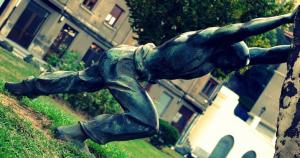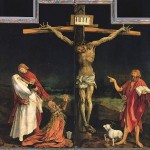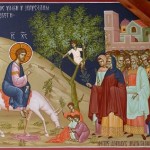 James 1:22-27
James 1:22-27
None of us likes people who say one thing and do another. In fact, some of our harshest criticism is for those who not only sin or do what is wrong but also do it in violation of what they themselves proclaim.
We have a word for such people: hypocrites.
To some extent we are all hypocrites, but as we all know there are hypocrites and then there are hypocrites.
This morning, James is concerned that we not be hypocrites, and so he says: “But be doers of the word, and not hearers only, deceiving yourselves.” This will be a major theme of James’ one book in the Bible: that our faith not be separated from our faithfulness and that our deeds match our words.
James gives us a memorable picture of one who is a hypocrite, whether intentionally or unintentionally. The one who hears the Word of God and therefore clearly knows what to do – but doesn’t do it – is like a man seeing his face in a mirror and immediately forgetting who he is. For a Christian to hear the Word of God and what God desires and to choose not to do it is to forget who he is: a child of God and a disciple of Jesus Christ who has vowed to renounce the ways of the world, the flesh, and the devil. More than “forgetting,” it is a denial of his own regenerated nature as one redeemed by Christ.
James doesn’t tell us the ultimate fate of one who merely hears the Word and doesn’t do it, but we know from other Scriptures that such men will not inherit the Kingdomof Heaven. James himself focuses on the blessings of the man who both hears and obeys. In verse 25 he tells us that the one who looks into the perfect law of liberty (i.e. “hears” the Word) and continues in it, and is not a forgetful hearer but a doer of the work, this one will be blessed in what he does.
Notice how clearly James connects what we do with what we hear and say we believe. It is not the one who hears who will be blessed or saved, but the one who both hears and does. It is obvious that the Word doesn’t save us just by being heard, otherwise all we’d have to do is buzz around the globe with gargantuan loudspeakers and make sure everyone heard the Word. James says in verse 25 that it is the one who does good works (is “a doer of the work”) who will be blessed. Notice, as well, that when James offers a description of true religion (verses 26-27), he doesn’t say something like “true religion is being able to say you believe Jesus Christ is your personal Lord and Savior.” No, James defines pure and undefiled religion as what we do: bridling the tongue, visiting orphans and widows, and keeping oneself holy.
When James says in verse 21 that the Word implanted in us is able to save our souls, he is saying that the Word must be implanted in our souls and not just scattered on the surface. James, the brother of the Lord, is likely remembering the words of the Lord when he told the parable of the sower and the seed and other teachings. The seed which is the Word will not save us if it doesn’t take root, and only the good soil took the seed in and produced fruit. For this reason, Jesus also taught that by their fruits you shall know them.
The Book of Common Prayer is filled with wonderful, memorable phrases that take either biblical verses or ideas and put them into liturgical form. One of the most memorable phrases that never fails to make me take notice is when we pray in the General Thanksgiving found in Morning and Evening Prayer that “we (may) show forth thy praise, not only with our lips, but in our lives.”
God is pleased when we show forth His praise not only with our lips but with our lives. In fact, a life that honors God with both lip and limb is one that will be blessed in what it does and one that will be saved.
There is one terrible consequence of the hypocrisy of Christians that James doesn’t mention or imply. It is one that I’ve seen countless times in my experience, especially during the 18 years that I taught school. I used to talk to the seniors at the Episcopal school I taught at who had been raised as Christians and who had now told me in private that they were atheists. The #1 reason they gave for giving up their faith? Christian hypocrites. One of them referred to the fact that he saw people from his church partying on the weekend and then pretending to be good little angels Sunday morning – if they made it to Sunday morning. Of course, if you tell a child that he only has to believe but not act like Christ, then this is a predictable consequence.
It’s even more predictable that Christian hypocrisy will give way to Christian apostasy when it is the parents who are hypocrites. When one parent goes to church and another doesn’t – even though parents are to some degree separable – it impacts the children (even if subconsciously) as hypocrisy. Because the couple is spiritually one flesh and should be serving the same God, it has the feel of hypocrisy. And it creates the option of whether to go to church or not and whether to believe in God or not. For this reason, the number of children who maintain their Christian faith drops dramatically when both parents don’t go to church.
Therefore, as James commands, let us be doers of the word and not hearers only, lest we deceive ourselves and others. Like James, my hope is that in both hearing and doing God’s Word, you will be blessed in all you do.
Prayer: Father, I thank You for the Word of Truth you have implanted in my soul. I pray that You would plant it so deeply within me, so carefully prepare the soil of my heart, so lovingly water it, and so warmly shine on it with Your Son, that I would produce fruit in due season.
Points for Meditation:
- Reflect on your attitude towards good works. Have you viewed them as an optional part of your salvation? Allow the Word of God that speaks on such matters, including the words of Jesus, the book of James, and the letters of Paul, to lead you to a deeper understanding of the importance of holiness and faithful living.
- Meditate on the kinds of sins of omission that are possible, since sins of commission receive much more attention. After you have made a list, which one is the Holy Spirit directing you to pay attention to?
Resolution: I resolve to find one sin of omission in my life and address it. I have sinned not only by doing those things I shouldn’t have done but also by not doing the things I should have done. Therefore, I will find one aspect of true religion God has been calling me to and that I’ve been avoiding and find a practical way to do what I know He has told me to do.
© 2011 Fr. Charles Erlandson
CC Image courtesy of Librarian by Matteo Bonera on Flickr.jpg











